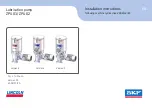
Map matching
As mentioned, the positioning systems used
by this navigation system are susceptible to
certain errors. Their calculations may, on occa-
sion, place you in a location on the map where
no road exists. In this situation, the processing
system understands that vehicles travel only
on roads, and can correct your position by ad-
justing it to a nearby road. This is called map
matching.
With map matching
Without map matching
Handling large errors
Positioning errors are kept to a minimum by
combining GPS,
“
Dead Reckoning
”
and map
matching. However, in some situations, these
functions may not work properly, and the error
may become bigger.
When positioning by GPS is
impossible
!
If signals cannot be received from more
than two GPS satellites, GPS positioning
does not take place.
!
In some driving conditions, signals from
GPS satellites may not reach your vehicle.
In this case, it is impossible for the system
to use GPS positioning.
In tunnels or en-
closed parking
garages
Under elevated
roads or similar
structures
When driving
among high build-
ings
When driving through
a dense forest or tall
trees
!
If a car phone or cellular phone is used
near the GPS antenna, GPS reception may
be lost temporarily.
!
Do not cover the GPS antenna with spray
paint or car wax, because this may block
the reception of GPS signals. Snow buildup
can also degrade the signals, so keep the
antenna clear.
p
If, for any reason, GPS signals cannot be re-
ceived, learning and error correction are
not possible. If GPS positioning has been
operating for only a short time, your vehi-
cle
’
s actual position and the current loca-
tion mark on the map may diverge
considerably. Once GPS reception is re-
stored, accuracy will be recovered.
Appendix
En
164
Appendix















































